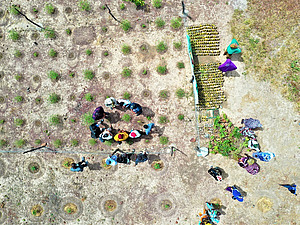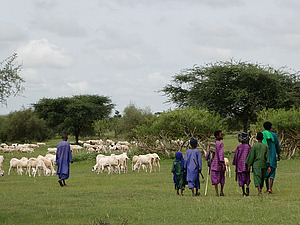In Senegal, transhumant shepherds take advantage of wet-season vegetation in drylands, as trials examine how enclosures around trees influence grazing pressure and therefore grassland rehabilitation and species diversity. (Photo: FiBL)
Organic and agroecological practices are increasingly recognized for their potential to transform global food systems, but it requires novel innovations across the entire value chain to truly scale them. These innovations must be supported through targeted measures to drive progress, hence enabling organic agriculture and agroecology to become a mainstream approach to food production. Our group is committed to advancing this vision by fostering innovation and supporting the adoption of beneficial agricultural practices worldwide. Through collaborative efforts, we aim to create scalable solutions that improve the livelihoods of farmers, enhance food security, and promote resilient agroecosystems.
Our main areas of work:
- Research – We conduct research and pilot projects focusing on organic and agroecological practices and innovations that aim to improve the livelihoods of smallholders and family farmers while promoting healthier diets for consumers. Our goal is to generate scientific evidence that underpins these innovations, fostering creative, pragmatic solutions through a participatory and collective approach.
- Promoting the adoption of organic and agroecological innovations – We actively support the socio-ecological and agronomic adoption of organic and agroecology worldwide. This is achieved with targeted dissemination, training, capacity building and exchange activities. We develop and test technologies and approaches to make dissemination efforts more impactful and effective by combining digital communication innovations and well-established methods.
- Diversity of topics – Our activities span a wide range of themes including socio-ecology, biodiversity, ecosystem services, agroforestry, crop protection and livestock systems. We work in interdisciplinary project teams, addressing the complex, interconnected challenges of agricultural value chains, ensuring that our work reflects the diverse needs of all actors in a healthy agroecosystem.
Projects
Team
| Group Agroecosystem Innovation & Adoption | ||
| Cicek Harun | Deputy Leader of the Group Agroecosystem Innovation & Adoptiondryland agriculture | +41 (0)62 865-0456 |
| Durot Chloé | System projects, agroecology, agroforestry and cropping systems | +41 (0)62 865-6392 |
| Keller Chigusa | Data analysis, system comparison | +41 (0)62 865-6368 |
| Saj Stéphane | Tropical agroforestry, cocoa, agricultural systems containing perennial plants | +41 (0)62 865-0483 |
| Schudel Seraina | System comparison, value chains and markets | +41 (0)62 865-7261 |
| Singh Akanksha | Diverse cropping systems, biocontrol, multitrophic interactions | +41 (0)62 865-0481 |
| Ulmann Selina Laura | Leader of the Group Agroecosystem Innovation & AdoptionDigital training materials, livestock | +41 (0)62 865-0472 |





